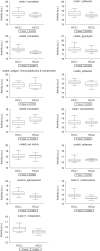Functional proteomics of colon cancer Consensus Molecular Subtypes
- PMID: 38486123
- PMCID: PMC11091086
- DOI: 10.1038/s41416-024-02650-6
Functional proteomics of colon cancer Consensus Molecular Subtypes
Abstract
Background: The Colorectal Cancer Subtyping Consortium established four Consensus Molecular Subtypes (CMS) in colorectal cancer: CMS1 (microsatellite-instability [MSI], Immune), CMS2 (Canonical, epithelial), CMS3 (Metabolic), and CMS4 (Mesenchymal). However, only MSI tumour patients have seen a change in their disease management in clinical practice. This study aims to characterise the proteome of colon cancer CMS and broaden CMS's clinical utility.
Methods: One-hundred fifty-eight paraffin samples from stage II-III colon cancer patients treated with adjuvant chemotherapy were analysed through DIA-based mass-spectrometry proteomics.
Results: CMS1 exhibited overexpression of immune-related proteins, specifically related to neutrophils, phagocytosis, antimicrobial response, and a glycolytic profile. These findings suggested potential therapeutic strategies involving immunotherapy and glycolytic inhibitors. CMS3 showed overexpression of metabolic proteins. CMS2 displayed a heterogeneous protein profile. Notably, two proteomics subtypes within CMS2, with different protein characteristics and prognoses, were identified. CMS4 emerged as the most distinct group, featuring overexpression of proteins related to angiogenesis, extracellular matrix, focal adhesion, and complement activation. CMS4 showed a high metastatic profile and suggested possible chemoresistance that may explain its worse prognosis.
Conclusions: DIA proteomics revealed new features for each colon cancer CMS subtype. These findings provide valuable insights into potential therapeutic targets for colorectal cancer subtypes in the future.
© 2024. The Author(s), under exclusive licence to Springer Nature Limited.
Conflict of interest statement
The authors declare no competing interests.
Figures





References
MeSH terms
Substances
LinkOut - more resources
Full Text Sources

